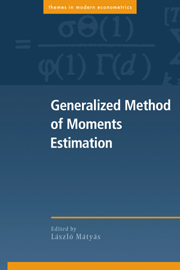Book contents
- Frontmatter
- Contents
- Contributors
- Preface
- 1 Introduction to the Generalized Method of Moments Estimation
- 2 GMM Estimation Techniques
- 3 Covariance Matrix Estimation
- 4 Hypothesis Testing in Models Estimated by GMM
- 5 Finite Sample Properties of GMM estimators and Tests
- 6 GMM Estimation of Time Series Models
- 7 Reduced Rank Regression Using GMM
- 8 Estimation of Linear Panel Data Models Using GMM
- 9 Alternative GMM Methods for Nonlinear Panel Data Models
- 10 Simulation Based Method of Moments
- 11 Logically Inconsistent Limited Dependent Variables Models
- Index
6 - GMM Estimation of Time Series Models
Published online by Cambridge University Press: 04 February 2010
- Frontmatter
- Contents
- Contributors
- Preface
- 1 Introduction to the Generalized Method of Moments Estimation
- 2 GMM Estimation Techniques
- 3 Covariance Matrix Estimation
- 4 Hypothesis Testing in Models Estimated by GMM
- 5 Finite Sample Properties of GMM estimators and Tests
- 6 GMM Estimation of Time Series Models
- 7 Reduced Rank Regression Using GMM
- 8 Estimation of Linear Panel Data Models Using GMM
- 9 Alternative GMM Methods for Nonlinear Panel Data Models
- 10 Simulation Based Method of Moments
- 11 Logically Inconsistent Limited Dependent Variables Models
- Index
Summary
In time series analysis, the basic univariate model is the autoregressive moving average (ARMA) one. The estimation of ARMA models has been the subject of a vast literature over many years. If a pure autoregressive (AR) model is considered then ordinary least squares (OLS) estimation is appropriate and is asymptotically equivalent to maximum likelihood when the errors are normally distributed. However, the introduction of moving average (MA) components to the model complicates the estimation problem because the least squares criterion is no longer linear in the parameters. Both least squares and maximum likelihood estimation for models involving MA terms involves numerical optimisation and is relatively computationally difficult. As a result, a variety of techniques for the estimation of models with MA terms have been suggested that do not involve numerical optimisation. These techniques have generally made use (implicitly or explicitly) of moment conditions implied by the ARMA model, and therefore fall within the class of GMM estimators. This chapter has two aims. The first is to provide an introduction to some of these moments–based estimators. The second is a pedagogic one to illustrate the general theory of GMM presented in Chapter 1 as applied to a relatively simple time series model.
An outline of the chapter is as follows. In Section 6.1 we discuss the estimation of pure MA models. For simplicity we focus mostly on first order MA models, and indicate how extensions to higher order models follow.
- Type
- Chapter
- Information
- Generalized Method of Moments Estimation , pp. 149 - 170Publisher: Cambridge University PressPrint publication year: 1999
- 7
- Cited by

